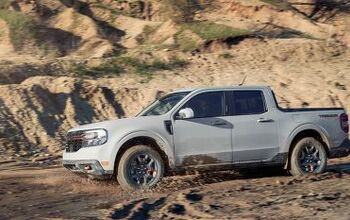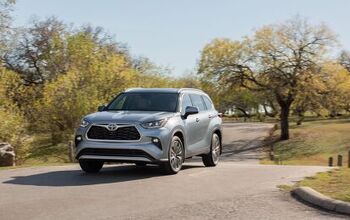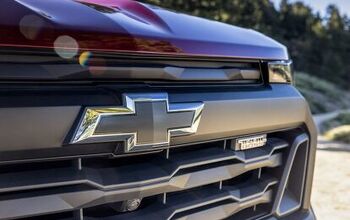Tesla Birth Watch 32: Musk Gets a Roadster. Is This the End of the Beginning?
A number of media outlets are carrying the story that Tesla chairman Elon Musk's personal Roadster has finally made it across the Atlantic and into his waiting arms. Everyone is proclaiming this as the first delivery of a production Roadster. Yet Petrol Head reports that as Musk got his, he indicated "the first deliveries" would start in mid-March. In the meantime, the second car will go to Tesla founder Martin Eberhard. So what about it gang? Would you consider this transfer of a hand-massaged example with a temporary transmission to the head honcho as the official start of Tesla Roadster production? Should we end the Tesla Birth Watch series with this installment? Or should we wait until we actually see the cars getting into the hands of a paying customer?
More by Frank Williams


































Comments
Join the conversation
My opinion is that until there are at least 100 Roadsters in paying customer hands, this thing is nothing more than a hand-built exotic. And wasn't one of Tesla's organizing principles that an all-electric sports car need not be an exotic but a working proposition for, if not exactly the masses, than at least more than a few well-heeled collectors?
It's sad to see all these arm-chair experts criticizing people who do amazing things. What have you done besides criticize. What Tesla is doing is incredible. A few months late and you think it is a failure. You will make yourself irrelevant.
I would compare the Tesla Roadster to another similar project that has captured the imagination of an admittedly much smaller group: The Red Camera. Jim Jannard, founder of the Oakley Sunglass company, really wanted a great video camera. Nothing the competition could do would satisfy him. So instead of being the usual grouchy and complaining American, he started his own company to design and build a camera for himself. So he hired an exceptionally competent team, and sold about 3,000 initial customers on his dream. His pitch: "I don't need the money but I need to know people want this. We're going to create a great camera, essentially a motion picture version of a full-frame Canon DSLR. If you give me your deposits, I will refund them, with interest, if at any time you want to back out." After two years, RED is finally delivering cameras. The customers, who are receiving a product that's superior to the $130,000 Sony for about $30,000, are extremely happy about the design and overall image quality of the unit. Nobody complains about the fact that RED camera serial numbers 1-5 went to Jim Jannard. Without Jim, there would be no RED. I think really, Elon Musk and Martin Everhard both wanted this car. Sure, they wanted to help save the world and get others involved, but really, they wanted the car, and they got it. Quite an achievement! Now, consider the RED again. The first few cameras dribbled out slowly. The delivery schedule repeatedly slipped, and slipped again. Early customers had problems with the lens mount; Jim took back every one and replaced it with a new mount at no charge. People still loved Jim, but many of them were upset by the delays. As far as I know, none of them asked for their deposit back, but they grumbled. Until they got their cameras. RED produced images that were every bit as great as advertised. So in light of this, I think you can see these are almost completely parallel situations. RED's been around longer and so we can see what happens when a group of enthusiastic people with deep expertise start a new company to tackle a fresh approach to an old industry with stagnant competitors. They do great, they mess up a few things, they fix them and they keep on going. As Jim said ( source)
The RED ONE is not perfect. The above reasons are just a few of many. RED Digital is not perfect. We are building a camera company from scratch. It is tough as a m%^&*@fu&^%r. Not what we expected. But we are awake. Alive. And more dedicated than anyone you have ever met to deliver what you want and need. We are a small team trying to slay the giant. You have the right to be nervous. We are. We are so nervous that none of us can sleep. But you will have to kill us to stop us. If you bring up a problem, we will listen and get on it like a cheap suit. We have. We will. We always will. I believe Tesla runs on a similar philosophy. Both of these companies have another thing in common: Extremely wealthy founders who can make mistakes, admit them, dump more money into the company and continue fighting the good fight that they believe in. So what does this mean? It means that what we are seeing at Tesla, with the exception of Martin's firing, which made me sad, is normal for any company trying to produce a new and revolutionary product that's radically different from what was done in the past. This is a tough job. Doesn't mean it can't or won't be done. They've built cars. They are great fun to drive. They have gone long distances without things falling apart or failing. If I am not mistaken, this is way further than most wannabe automakers have gotten. I think it would be reasonable to assume that they will be able to solve their problems, considering that Musk has committed to continued funding of the company. Someone in a previous comment did a quick financial statement of the company and saw them with a substantial loss. It seems pretty impressive to me that a car company could come so close to making money in its first year of production. Startup expenses to make the Roadster would be enormous. It might cost several million dollars to make the first car but only in the mid five figures to make subsequent models. I would expect that over the four years or so it was made, the vehicle would generate profits. Finally, it seems obvious that demand for this car is likely to remain very high. If we consider the car competitive with a Porsche 911 (similar acceleration figures and cost), we see that Porsche sold no less than 2,238 $94k Carrera S Cabriolet models. That is just one model of 911; the whole series sold 12,045 cars in 2007. Here's a Porsche press release that was my source for 911 sales. So as you can see, Tesla is not dissimilar to other companies, such as RED, that have attempted successfully to revolutionize their industries. Furthermore, it seems likely that, thanks to its wealthy backers, Tesla has enough access to capital to successfully reach its goals. And finally, it seems likely that the product's appeal will result in continued high sales going forward. To be honest, I'd rather be Tesla or RED (with a product everyone wants but they can't make) than GM, who can make a whole bunch of cars nobody cares about. Customers will wait, albeit grumpily, for a RED camera or Tesla Roadster, while they continue ignoring GM products. My conclusion, then, is that you're being too harsh on Tesla with the Birth Watch. As the same time, I don't want you to discontinue it, because I want to continue hearing solid reporting from an impartial source about what's going on in Tesla. It's a fascinating story and it deserves to be told with due scrutiny. Perhaps when the first car does go to its heated garage, we can have the articles simply renamed "The Tesla Watch", and we will leave to history what happens next ... It's one wild ride, that's for sure. D